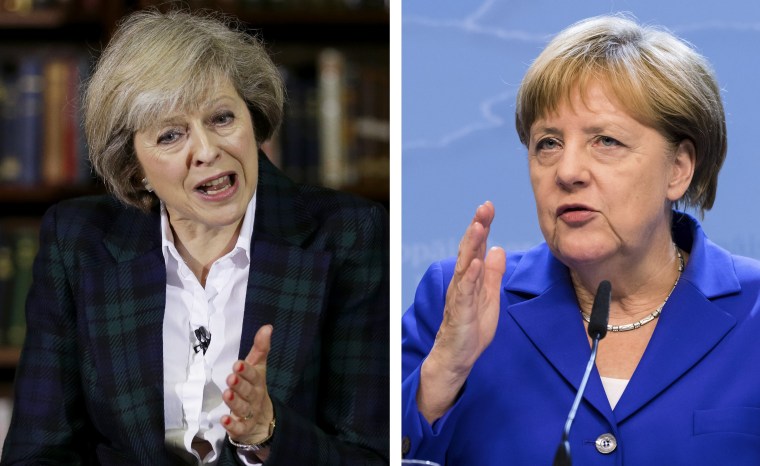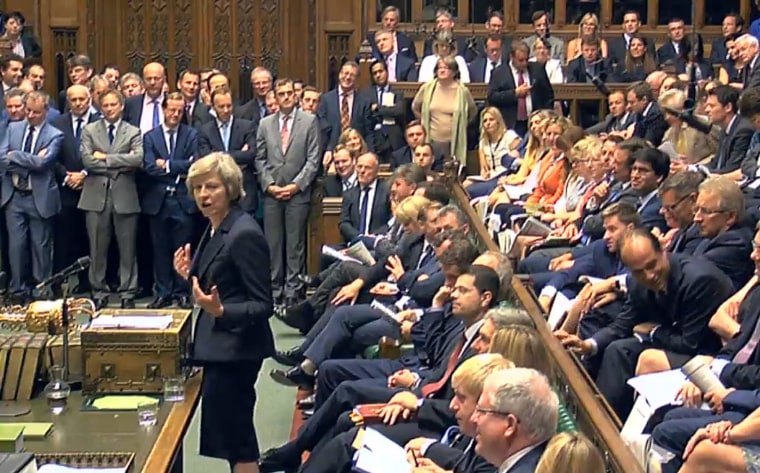LONDON — Two of the world's most powerful women met formally for the first time Wednesday to reset relations and begin implementing Brexit after the U.K. voted to leave the European Union.
New British Prime Minister Theresa May said she would talk “frankly and openly” with German leader Angela Merkel less than a month after the referendum plunged the continent into a political and economic crisis.
The pair must decide how to reshape Europe’s power balance even as the EU tackles other urgent problems including the migrant crisis and rise of ISIS.

May was expected to be asked when she will invoke Article 50 of the EU's constitution, which triggers the two-year process of quitting. She wants to wait until the end of the year but Merkel and other EU leaders say there can't be any substantive talks about post-Brexit trade deals until Britain sets a timetable — and there are signs that Brussels is running out of patience.
May, who took over last week from David Cameron after he quit over the referendum result, campaigned for Britain to remain in the EU but has since promised to honor the outcome, saying “Brexit means Brexit.”
It leaves both women negotiating the terms of a political divorce that neither wanted.
“I do not underestimate the challenge of negotiating our exit from the European Union and I firmly believe that being able to talk frankly and openly about the issues we face will be an important part of a successful negotiation,” May said Wednesday before traveling to Berlin.
A spokesman for the U.K. prime minister told NBC News that May has only previously met Merkel on the sidelines of a summit in Malta about the migrant crisis.
Yet the two leaders have a surprising amount in common. Both are the children of small-town pastors, both come from the conservative end of the political spectrum — although Merkel is a more progressive social democrat — and they share a steely, low-key pragmatism and an uncomfortable relationship with the media.
After a working dinner with Merkel, May was due to travel to Paris Thursday to meet French President Francois Hollande. As well as holding talks about the EU, they will discuss counter-terrorism cooperation in the wake of last week's deadly truck attack in Nice.
Before departing on her first trip abroad, May gave a commanding performance at her Prime Minister’s Questions — the rowdy weekly session at which lawmakers give the leader a 30-minute grilling across the floor of the House of Commons.

She seized the opportunity to taunt opposition lawmakers over women's rights, pointing out that it was her party that had made her Britain’s second female leader after Margaret Thatcher.
"In my years here in this house I've long heard the Labour Party asking what the Conservative Party does for women, well it just keeps making us prime minister!" she said to huge cheers from her colleagues as her husband Philip looked on from the public gallery.
Earlier, May announced Britain would give up its turn at holding the EU presidency in the second half of 2017 in order to fully concentrate on Brexit.
Related: 'Bloody Difficult Woman' Is New U.K. Prime Minister
Meanwhile, new U.K. finance minister Philip Hammond was preparing to meet his counterparts at a global summit where he is expected to be asked how he can achieve Brexit without further damaging the global economy.
The shock victory for Brexit — 52 percent voted to "Leave" the bloc — hammered stock markets and weakened confidence. A report by analysts HIS Markit on Wednesday predicted Brexit would reduce global growth from 2.5 percent to 2.4 percent in 2016 and from 3.1 percent to 2.7 percent in 2017.
